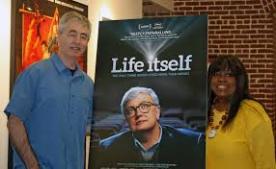 He could be generous and petty, competitive and nurturing, absurdly public and ferociously private.
He could be generous and petty, competitive and nurturing, absurdly public and ferociously private.
And given access to a soap box, you could be sure Roger Ebert would scramble on top of it. Quite aside from being America’s most famous film critic, Ebert was a film enthusiast, a critic who championed films in print and on TV, cajoling-begging-demanding that America sit up and pay attention to a movie he loved.
It happened to Oscar winning documentary filmmaker Errol Morris (“The Fog of War”), whose work Ebert championed all his career. And it happened to another documentarian, Steve James, who owes his career to the attentions of Ebert and his TV foil, Gene Siskel.
“Their impact on ‘Hoop Dreams’ (1994) was remarkable,” James remembers. “This was a three hour documentary about basketball and two kids and their families from Chicago, people nobody had ever heard of, and when we got the film into Sundance, we submitted it to distributors. Didn’t hear a peep…But when Roger and Gene reviewed it on the show, during the Sundance Film Festival, they said ‘We really think it deserves wider distribution’ during the review, suddenly, the Sundance showings were sold out and we got distribution.”
That long-ago endorsement made James famous. And it made him the natural choice to make a documentary about Ebert, based on his memoir, “Life Itself,” a film that would, of course, turn out to be about Siskel as well.
After Siskel died and as Ebert faced his own mortality — losing his voice and much of his face to cancer, before finally succumbing in 2013 — James and Ebert discussed documenting the life Ebert described in his 2011 memoir.
“I told him I wanted input, but that I would have final say,” James recalled. “Roger and (his widow) Chaz understood that. But as that one email that he sent me that’s in the movie is the most important.
“He said, ‘This is not just your film, it’s mine.’ I love that. I want every subject to feel that way about a documentary I make with them.”
James captured the last months of Ebert’s life and had access to decades of Ebert TV appearances and his newspaper cronies and college pals. He filmed the movie’s anchoring event, the Chicago Theatre memorial service that drew moviegoers and movie makers, singing Ebert’s praises.
“I’m puzzled by how beloved he seemed to be,” Chaz Ebert says, noting how “beloved” and “critic” rarely turn up in the same sentence. “I think he was extremely likable, down to Earth, charismatic and very funny. But he also could connect with people. He was real. That’s how he did it.
“He only had a competitive edge when he was around Gene Siskel. With others, he seemed very generous – moviegoers, other critics, actors. He didn’t seem to feel threatened by them, and that disarmed people. That’s the kind of guy he was. What you saw with him was what you got.”
That line filmmaker Oliver Stone used about Ebert stands out — he was “Midwestern fair” in his assessments.
As “Life Itself” notes, Ebert became a critic at what James calls “a golden moment,” 1967, as “Bonnie and Clyde” and “2001” were launching American “cinephile culture.” Ebert championed films, first for the Chicago Sun-Times, and then on assorted TV shows paired with Siskel, and James says “helped shape the cinema” over three of the most important decades in Hollywood history. An early adapter to the Internet — Ebert saw the potential in Google so early, and put money into it, that he was invited into its IPO (Initial Public Offering) when the company went public and offered stock — Ebert talked movies, politics and eventually, his illness, on his wildly popular blog.
Even critics who didn’t grow up with Ebert’s decades-long TV presence have been touched by “Life Itself,” an “impressively clear-eyed and deeply moving portrait” (Amber Wilkinson, Britain’s Daily Telegraph).
“I want people to know that he grabbed life with both hands, with gusto and joy, right up to the end,” Chaz Ebert says. “That’s a model for anybody who had good fortune in life, as he certainly did, and then illness, surgeries. He was someone who never lost that gusto.”
Top Posts & Pages
- Documentary Review: "The Guardian of the Monarchs" remembers a Murdered Nature Activist in Mexico
- Netflixable? "The Courier" Glibly Skips by a Scandal for a tale of High End Spanish Money-Laundering
- Netflixable? An indulged childhood, growing up the son of a drug lord, "Down the Rabbit Hole"
- BOX OFFICE: "IF" opens #1, but underwhelms, "The Strangers" turn out to be old friends, "Back to Black" Bombs
- Movie Review: A Scientist Wife, a brain-damaged husband and "The Portrait" that looks hauntingly familiar
- Movie Review: An ex-con, a sailor lass and a killer face their fates outside the "Breakwater"
- Movie Review: Not a "longtime fan" of "First Time Caller"
- Classic Film Review: "Leon: The Professional" (1994), as Twisted as You Remember It
- Movie Review: Tom Sizemore suffers through the Cinematically Interminable -- "Impuratus"
- Movie Review: GIs endure "3 Days in Malay" in the Guadalcanal Campaign
Find a Movie Review
Like Movie Nation on Facebook
